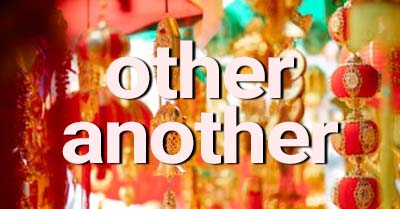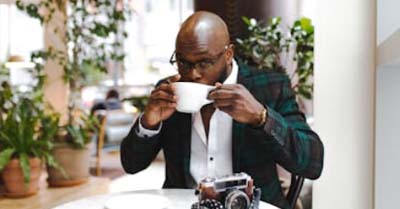Let’s examine how to use other, another, the other, and others as they appear in different sentences.
This two-page lesson has exercises so you can practice what you have learned.

Frans van Heerden | Pexels
“Other” as a Determiner
Other means additional, alternative, or different types of something.
”Other" is used (1) with singular noncount nouns (e.g., other music, other news, other information, other advice) or (2) with plural nouns (for example, other colors, other types, other words).
Example sentences using “other”
“Other” with singular noncount nouns
You can learn about our courses on this page. Click “information” for other information. (additional or extra information)
John only listens to rap. He likes no other music. (other types of music)
The instructor told Peter to study harder. She gave him no other advice. (additional or extra advice)
Do you have any other luggage? (additional luggage)
“Other” with plural nouns
I have been reading Stephen King novels for months now. I want to read other writers. (additional or alternative writers)
I like my job, but I’ve been looking for other opportunities. (additional or alternative opportunities)
Do you have any other bags, or is this the only one? (additional bags)
“The Other” as Determiners
When you use other before a singular count noun, you usually need to use an article (”the”) before it.
“The other” can also be used to give an additional choice or alternative, usually when there are two alternatives.
Example sentences using “the other”
“The other” with singular, countable nouns
This door is locked. Please use the other door. (the alternative door)
Would you like to read this book or the other one? (the alternative between two books)
John has two brothers. One lives in Chicago, and the other just moved to Miami. (additional between two brothers)
This dictionary has simple definitions. The other dictionary is more difficult to read. (additional between two choices of dictionaries)
”Another”
”Another” has the sense of one more, an alternative or an additional person, thing, or concept.
Example sentences using “another”
I love this coffee. May I have another cup? (one more or an additional cup)
I don’t like the food here. Shall we go to another restaurant? (an alternative restaurant)
I already have enough shirts. I don’t really need another one. (an additional shirt)

nappy | Pexels
“Other,” “Another,” and “Others” as Pronouns
When you say, “Use the other door” or “Have another cup,” the nouns are “door” and “cup.” However, you can use “other” and “another” to replace the noun, which makes it a pronoun.
Example sentences using “other” and “another” as pronouns
I don’t like this dictionary. Do you have another? (another dictionary)
When you finish this exercise, start doing another. (another exercise)
When you finish this exercise, start doing the other(the other one of two exercises)
You’re the only one here. Where are the others? (the other people)
Some of us left the party at 11, but others stayed. (other of us)
John has two houses. One is in the city, and the other is at the beach.(the other house)
Two or More Choices or Alternatives
When you list people or things or when you have many choices, you say one, another, another, another… and finally the other. “The other” signals the last alternative or item.
When listing only two people or things or when you have only two choices, you say one and the other. There are only two items or choices so, of course, “the other” signals the second (and last) one.
Compare these examples
Example 1. How many brothers do I have?
One of my brothers lives in Chicago. The other lives in Miami.
(I have only two brothers)
One of my brothers lives in Chicago. Another lives in Miami.
(I have more than two brothers, but it is unclear how many.)
Example 2. How many students are there?
One of the students earned a perfect score on his exam. The other failed it!
(There are only two students: one who aced the exam and one who failed it.)
(There are only two students: one who aced the exam and one who failed it.)
One of the students earned a perfect score on his exam. Another one failed it!
(It’s unclear, but there are more than two. Only two students were mentioned, but there may be one or many others.)
One of the students earned a perfect score on his exam. Another earned a 95. The other failed the exam.
(There are three students. All three of them were mentioned.)
Example 3. How many best friends do I have?
Two of my best friends are doctors. Another is a dentist. The other is an engineer.
(I have four best friends: Two are doctors, one is a dentist and, finally, the other one is an engineer. )

Fauxels | Pexels
”each other” and “one another”
You use each other to show that the action is mutual or reciprocal. For example, if John sees Mary and Mary sees John, they see each other.
You use one another meaning the same as “each other” when more than two people or things are involved. The focus is on a reciprocal action among members of a group.
(See the basic lesson on reciprocal personal pronouns in a new tab.)
Important! In some grammar books, you may see the above distinction between “each other” (referring to two) and “one another” (referring to more than two). Such a distinction is often not observed, especially in informal, spoken English. You can use them interchangeably.
Example Sentences
- They love each other.
- We saw each other on the bus.
- My boss and I very often disagree with each other, but we also respect each other’s opinions.
- My best friend and I talk to each other on the phone every day.
- My brothers and sisters live all over the world. We only see one another on Christmas.
- School children make fun of one another all the time.
- My students help one another study for the exam.
- Students can get in trouble if they copy one another’s work.
In all the above example, you can use each other and one another interchangeably without any differences in meaning.
Up Next: Expressions Using “Another”
Continue the lesson to learn more expressions using “other” and “another.”